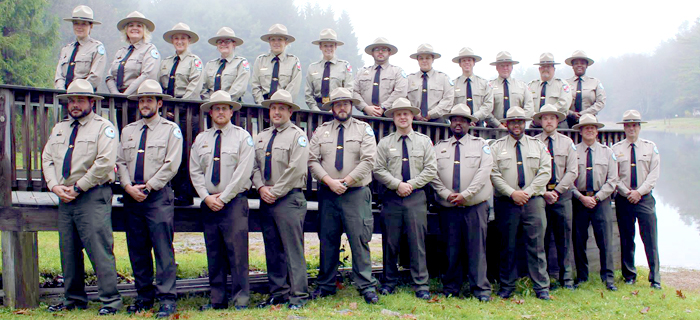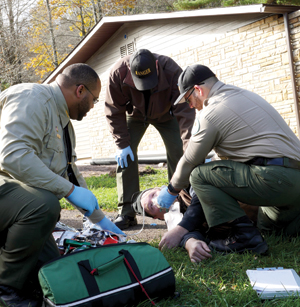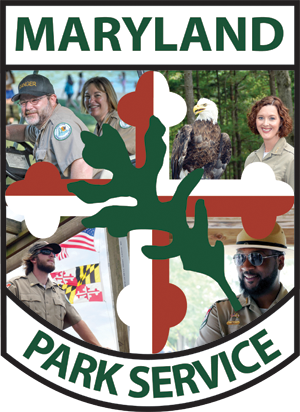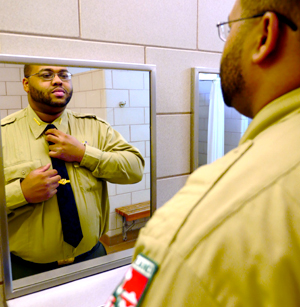The Making of a Ranger: State parks gain new stewards in uniform

New rangers in uniform; staff photo
The call comes in late in the afternoon, as the park office is about to close for the day. On the other end of the line, a frantic mother exclaims that her son is hours past his expected arrival home from his routine hike through New Germany State Park. The park ranger on duty takes down all the information regarding the boy’s description, his age, when he was last seen and what he was wearing.
As the mother provides more details, the ranger notes that it is only 50 degrees out and a light rain is falling—the urgency increases with each passing minute as daylight wanes. The ranger completes the phone call as she gets contact information from the mother.
The ranger then contacts the park staff over her mobile radio, alerting them to a possible missing person. Other rangers converge on the park office and are given assignments to begin a hasty search in the area where the son was last seen. Rangers check the restrooms quickly, traverse the most popular trails and search the day-use areas looking for any clues or signs of the young man.
After several minutes pass with no sign of him, the ranger decides to call for a more extensive search and contacts the Maryland Natural Resources Police.
While this incident plays out, however, several observers sit back and watch the events unfold, taking notes and quietly discussing the action. This may seem rather counterproductive, perhaps even negligent considering the circumstances, but these observers are actually seasoned rangers conducting training at the Maryland Park Service Ranger School. This search—the missing person and his frantic mother—are all part of a well-orchestrated fictional scenario to train and develop new recruits.

Rescue training; by Stephen Badger
What it takes
Ranger school serves as the primary “basic training” for newcomers beginning their careers in managing, preserving and protecting the state parks across Maryland. The four-week residential academy, hosted most recently at New Germany State Park, teaches many of the basic skills and provides introductory knowledge to get these rangers started with a solid foundation to hit the ground running back at their “home” parks. While most people are familiar with the cultural icon of “The Park Ranger,” in reality, the job goes well beyond the glamorized (and sometimes misunderstood) role portrayed in popular media.
The Maryland Park Service defines the park ranger as having professional responsibility for the protection and stewardship of cultural, historical, natural and recreational resources. By incorporating education, interpretation, public safety and resource management skills, Maryland Park Rangers serve the public as mentors, inspiring a stewardship ethic and a passion for conservation.
This definition, along with the overall mission of the Maryland Department of Natural Resources, serves as the fundamental pillars upon which the ranger school curriculum is based. The instruction features a combination of classroom lecture and hands-on activities, all led by veteran rangers and professional experts. However, the curriculum teams this instruction with an innovative approach to reinforce these skills.

Clockwise: Veteran rangers at Greenbrier, Rocky Gap, Assateague and Pocomoke River
Active learning
During the month of training, students work in groups to operate and manage a fictional park within the real-life park. Rotating tasks each week, the new rangers are divided into four teams: Operations, Maintenance, Interpretation and Administration. These teams and their associated duties and responsibilities reflect the diverse roles a Maryland Park Ranger plays each day in real life.
Seasoned staff members work together in playing various roles in a range of scenarios to challenge the Operations Team (such as reporting a missing child to instigate a search). The Maintenance Team works together to maintain the park and affect various repairs on buildings and equipment. The Interpretive Team develops educational and recreational programs. Finally, the Administrative Team operates a concessions program, practicing the skills of inventory management and cash handling.
Tightly nestled in between classroom instruction, hands-on activities and scenario-based park operations, the students are also challenged with routine quizzes, daily impromptu presentations and weekly exams.
Not to give the impression that ranger school is all busy work, ample time is given to allow rangers to take part in a variety of outdoor tasks that brought most of them to this profession in the first place: campground management, chainsaw skills, GPS and land navigation skills, search and rescue, trail development and maintenance and a host of other traditional tasks.
“Ranger School is a great opportunity for new employees to learn firsthand from experienced rangers and other subject matter experts from around the state,” explains Ranger Andrew Hangen, the dean of the 2017 school. “These experienced employees can then serve as mentors after school is over and help them further their careers.”

New ranger; by Stephen Badger
Class of 2017
This past November, the Maryland Park Service graduated 19 new rangers from all across the state. These newly trained rangers span a wide range in age and background.
Most of the recruits are new or recently hired state employees. Several have a few years of seasonal experience with the agency. A few are current maintenance workers who want to combine their skills with a greater understanding in park operations. Several others recently served in our Maryland Conservation Corps, whetting their appetite for a career in the parks.
Despite their diversity in background, one thing now binds them together. They have joined a tradition with roots that were planted more than 100 years ago.
They are now proud to call themselves Maryland Park Rangers. The legacy will continue as future ranger school classes train and develop new generations of park rangers to watch over our most special places.
Article by Ranger Steve McCoy—Central Regional Manager for the Maryland Park Service and Dean of the 2015 ranger school class. Appears in Vol. 21, No. 1 of the Maryland Natural Resource magazine, winter 2018.


 1-888-373-7888
1-888-373-7888 233733
233733